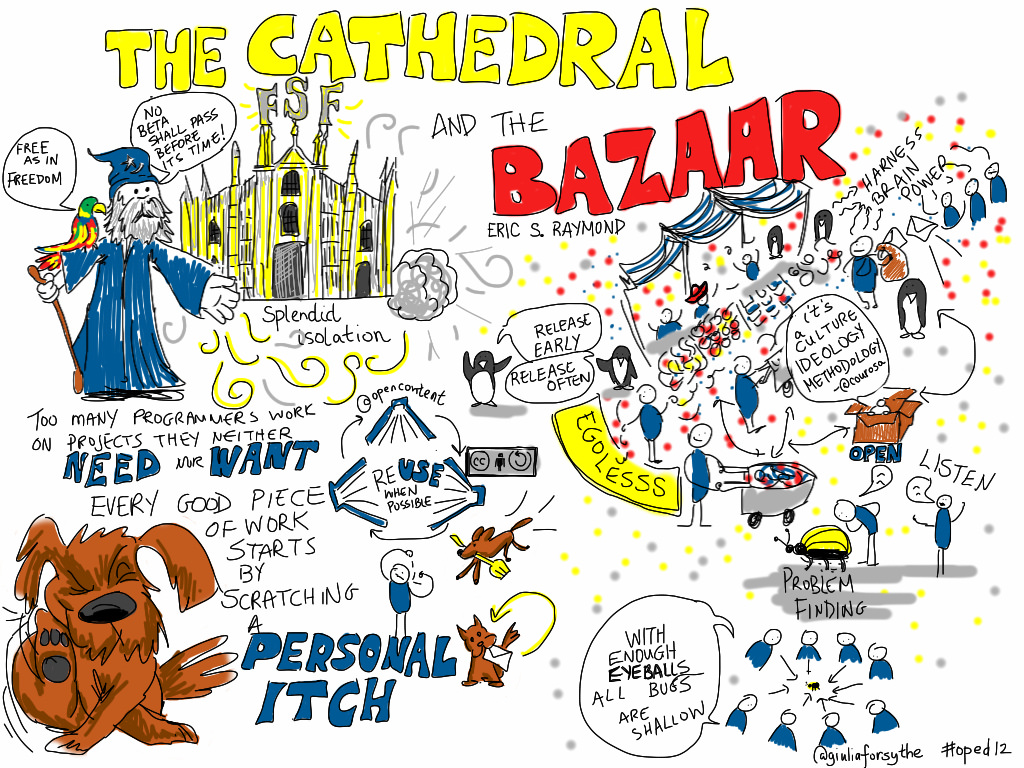Syllabus
LTEC 647c Free and Open Source Software in Education
Spring 2016
Course Description
Exploration of the free software and open-source software (FOSS) movements, their potential and impact on educational institutions, scholarship, and society.
 image: The Cathedral and the Bazaar by Giulia Forsythe / CC BY-NC-SA
image: The Cathedral and the Bazaar by Giulia Forsythe / CC BY-NC-SA
Learning Objectives
After completion of ETEC 647C, students will be able to:
- Explain the relationship of source code to executable software
- Recall the FSF's Free Software definition and explain the four user freedoms
- Differentiate which of the Free Software criteria rely on source code availability vs. license terms
- Explain the 10 points of the OSI's Open-source software definition 6 purpose of copyleft
- Advise a novice on what copyright is, and how a user acquires the right to use copyrighted works
- Explain what the Public Domain is
- Explain what open licenses such as Creative Commons, and what proper attribution and remixing are
- Explain the concept of open standards, and analyze current issues with open standards
- Evaluate FOSS software tools for specific educational uses
- Develop intermediate to advanced competency in one FOSS application of high professional interest
- Explain basic human motivation factors and how they influence educators and FOSS communities
- Participate in a FOSS community using typical web-based tools
- Contribute to a FOSS project in a meaningful way
- Explain FOSS/open business models to an interested person
- Identify and use basic features of F/OSS educational research software
- Assess the ICT needs of an educational organization and make recommendations based on organizational factors and relevant F/OSS
Course Format
Online. Asynchronous lessons, specific lessons include synchronous sessions. Students near the UHM campus are encouraged to attend synchronous sessions in person.
Prerequisites
None (instructor approval)
Synchronous Meetings
For synchronous meetings, students have the option to participate online or in-person. In-person participants can join from Wist 217. Online participants will use Blackboard Collaborate or Google Hangout on Air, as designated. See your Laulima section site for this course for the latest link.
Instructors
Billy Meinke, M.Ed Department of Learning Design and Technology (LTEC) IT Specialist, Technology & Distance Programs College of Education Everly Hall 124, Office Hours by appointment [email protected]
Paul McKimmy, Ed.D Educational Technology Department Director of Technology & Distance Programs, College of Education Everly Hall 129, Office Hours by appointment (808) 956-6266 (no voicemail service), [email protected]
Texts
Fogel, K. (2013). Producing Open Source Software (2nd ed.). O'Reilly Media. Available in PDF, ePub, HTML (gratis).
Free Software Foundation (Cambridge, Mass.), & Stallman, R. (2010). Free software, free society : selected essays of Richard Stallman (2nd ed.). Boston MA: Free Software Foundation. Available in hard copy ($20) and/or PDF (gratis) from the Free Software Foundation. ISBN 978-0-9831592-0-9.
Hoe, N. S. (2006). Free/Open Source Software: Open Standards. UNDP-APDIP. Available online at wikibooks.org. ISBN 978-81-312-0538-9
Weber, J. H., Cartwright, J., Faile, R. et al. (2013). LibreOffice 4.0 Getting Started Guide. The Document Foundation. Available in hard copy ($20.27) and/or PDF or ODT (gratis) from The Document Foundation.
Other web-based resources as assigned.
Equipment and Materials Required
- Computer with minimum 20 GB free space and a CD drive (internal or external)
- Current operating system: Ubuntu 14.04, Windows 7, OSX 10.6 or later
- Current Web browser: Chrome 37+, Firefox 36+
- Headset and microphone (USB recommended) for audio conferencing
- Web camera for video conferencing
Disabilities Statement
If you have a disability and related access needs, please contact the KOKUA program (UH Disabled Student Services Office) at 956-7511, [email protected], or go to Room 013 in the Queen Lili‘uokalani Center for Student Services. Please know that I will work with you and KOKUA to meet your access needs based on disability documentation.
Plagiarism
I have a zero tolerance policy for plagiarism. In this day and age, information flows freely, and it is each student's responsibility to ensure that they properly cite any sources used in their work. Plagiarism will be dealt with on a case-by-case basis, in accordance with the UHM Student Proscribed Conduct Code. Plagiarism may result in a lowered grade for the course, and all incidents will be reported to the Office of Student Affairs.
College of Education Conceptual Framework
A sense of purpose, a sense of place: Preparing knowledgeable, effective, and caring educators to contribute to a just, diverse, and democratic society — The College of Education envisions a community of educators who provide innovative research, teaching, and leadership in an effort to further the field of education and prepare professionals to contribute to a just, diverse, and democratic society. The College aims to enhance the well being of the Native Hawaiian people and others across the Pacific Basin through education.